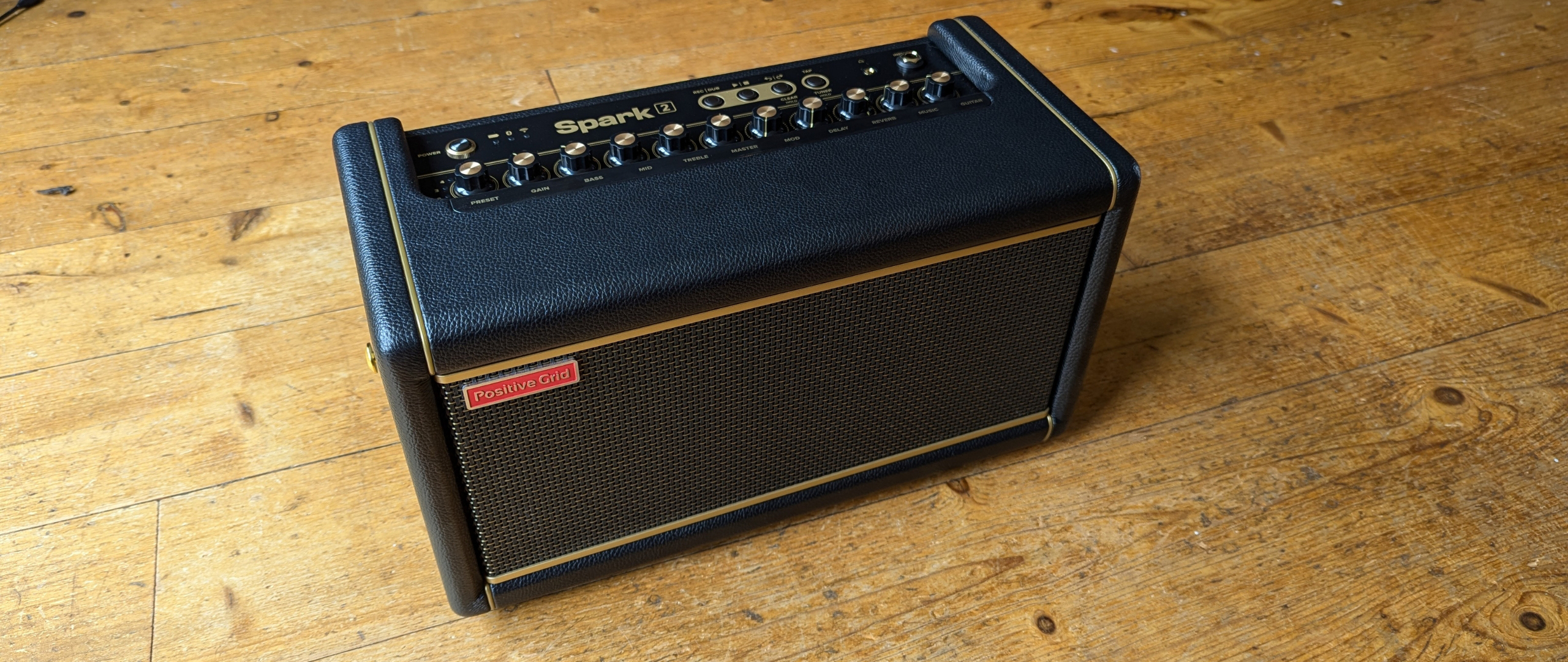
Power: 50W
Speakers: 2x 4-inch full-range
Amp models: 33
Effects: 43
Looper: 60 seconds
Pre-order at Positive Grid
The original Positive Grid Spark 40 has got to be one of the most impactful guitar amps ever made. Before Spark, the phrases desktop amp and smart amp weren’t really in the average guitarist's lexicon, and I’d certainly never called any of my guitar amps clever before.
But that’s exactly what Spark is, a canny guitar amp that enhances any kind of guitar player's practice regimen, in conjunction with likely their most used device, the smartphone.
All this means the Positive Grid Spark 2 has got a hell of a reputation to live up to. Trying to follow a practice amp that spawned a hundred imitators is a pretty tough ask, even for a company as inventive as PG. But try they must, as we guitarists have been hungry for Spark 2 for a long time now. Let’s get to it…
Positive Grid Spark 2 review: Features
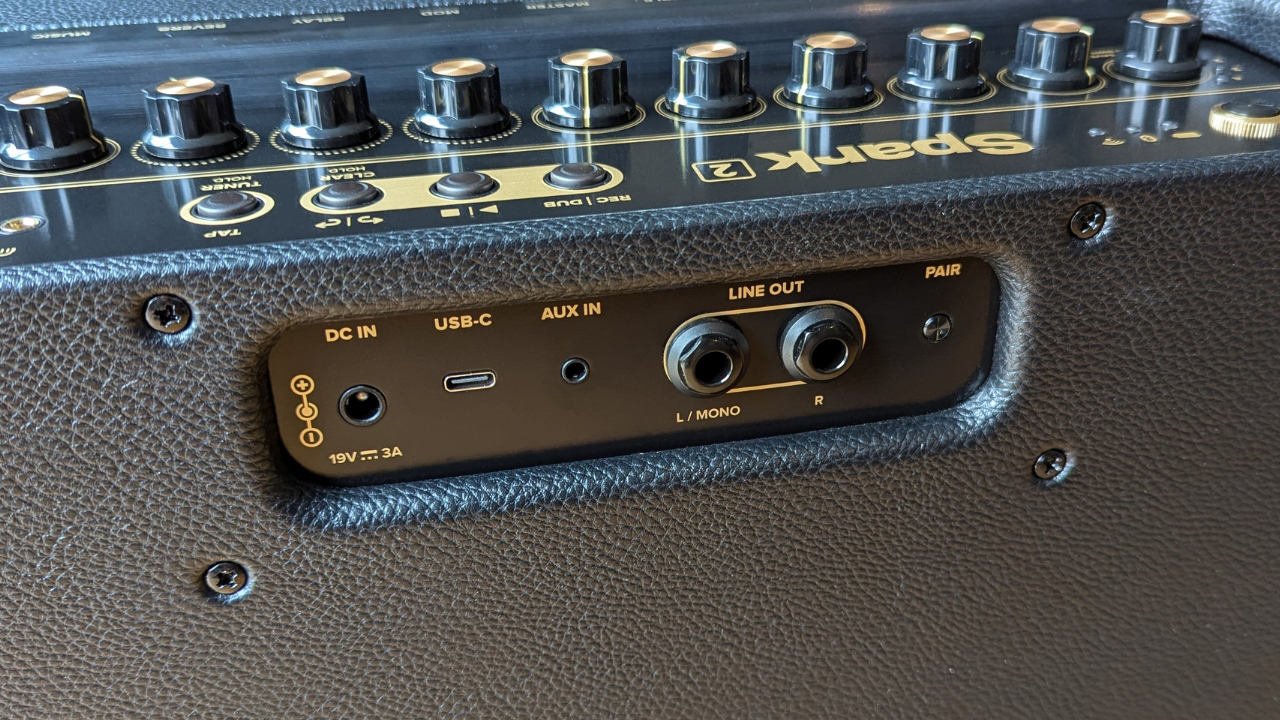
Upon unboxing my pre-release model of Spark 2, it’s immediately apparent that not much has changed in terms of looks. It’s pretty much identical to the original Spark in terms of aesthetics, with the same shape, the same gold piping, and the same black Tolex. The grille is slightly darker than I remember, but other than that it's all pretty similar.
A look at the top panel is where you’ll start to notice the first changes. Gone are the four preset/tap tempo LEDs, replaced with that most requested feature from all Spark-lovers, a built-in looper. It’s got three buttons, one for rec/dub, one to play stop, and one that clears the last loop if you hold it down.
The rest of the top panel is largely similar to the previous Spark amp, with the only major change being a new preset switch that replaces the amp model selector. It’s got four options, with a press down of the knob doubling that to eight. The rest of the amp and effects controls are the same, but like the recently released Spark Live, Spark 2 now also has a dedicated music and guitar knob for balancing your streamed or aux-in audio with your guitar tone.
On the back things have changed too. It takes a slightly higher amp PSU at 3A, the USB-B has been upgraded to a USB-C, and we’ve now got two stereo 1/4-inch line outs to add to the mix. The aux-in remains, and there’s now a pairing button for connecting your smartphone or other Bluetooth devices.
Positive Grid Spark 2 review: Sounds
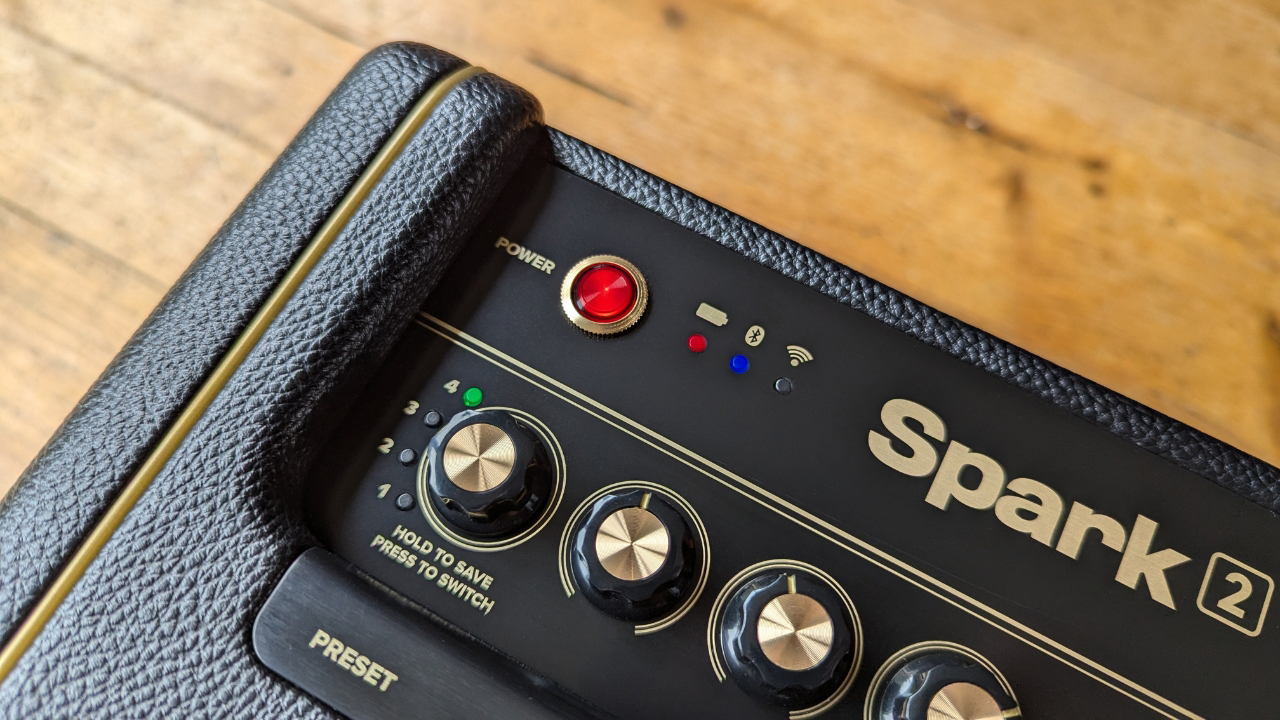
Needing no further encouragement, I promptly whipped out my favorite Tele, powered it on, and got to playing. It sounds incredible. Even just using the base sounds with the presets, I’m immediately impressed with how lifelike it feels. One of the patches had that feel of a dimed amp, where lead notes are right on the edge of blossoming into feedback, except it’s all happening at a level that doesn’t even wake my cats from their slumber.
Cycling through the presets I’m greeted with thick, sludgy rock tones that cater extremely well to the riff-hungry, all-out metal lead tones, and of course, some gorgeous cleans. There’s a particularly delightful ambient clean tone with the ‘reflector’ reverb that had me playing creepy diminished arpeggios for a good ten minutes.
There spread of stereo reverb and delays are beautiful thanks to the slightly angled out speakers, delivering a depth to the tone that belies its small stature. Thinking back to the time before amp modeling, I really can’t help but marvel at just how good it sounds.
It’s loud as well. With Spark 2 delivering 50 Watts when turning the volume up, I’m immediately greeted by a death stare from my cats as I start to really lay into some riffs. In a decent-sized living room it’s absolutely deafening when cranked, but the speaker never gets flappy. It’s far more than you’d ever need for practice realistically, but still, it’s nice to have the option to let rip when everyone’s out of the house.
Positive Grid Spark 2 review: AI
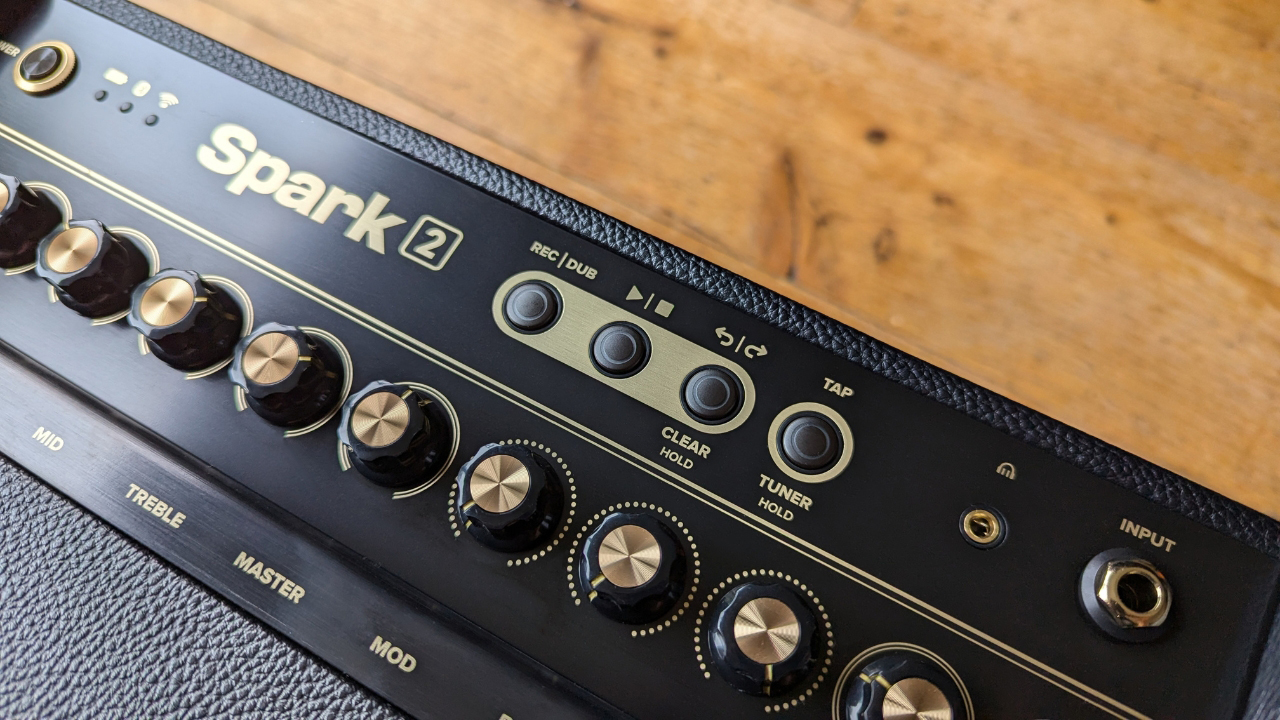
AI has fast become the buzzword for the last few years and yes, it’s now in your guitar amps too. Taking center stage in the Spark App in the bottom menu is the all-new Spark AI feature, which promises to generate any tone you like with a few simple words. The pre-loaded examples like ‘Full, clean tone with rich resonance for acoustic harmonics’ sound great, but trying to come up with my own creative prompts left me scratching my head a little.
Each time you prompt it you get four results to pick from, much like Midjourney image creator. All your prompts remain in the session which is handy, so you can always go back if you don’t like the latest version you’ve generated.
Much like most AI tech out there, you really need to finesse your prompt to get the right results. I tried ‘Tom Morello rhythm tone’ initially, but that resulted in high gain, metal-style sounds that weren’t quite the right thing. Instead trying ‘fat, low gain rhythm tone’ got me a much closer result to what I was aiming for.
Prompts like ‘sludgy doom rhythm tone’ and ‘classic rock solo tone’ worked really well, delivering pretty much exactly what I was looking for. You can even name-drop famous songs too. Spark 2 gave me a nice version of Tony Iommi’s classic ‘Paranoid’ guitar tone, as well as a genuinely great tone for ‘Where The Streets Have No Name’. It is a mixed bag at times, but when it’s good it’s scarily good, and I can only presume it’s going to get better the more data it’s fed.
Positive Grid Spark 2 review: Looper
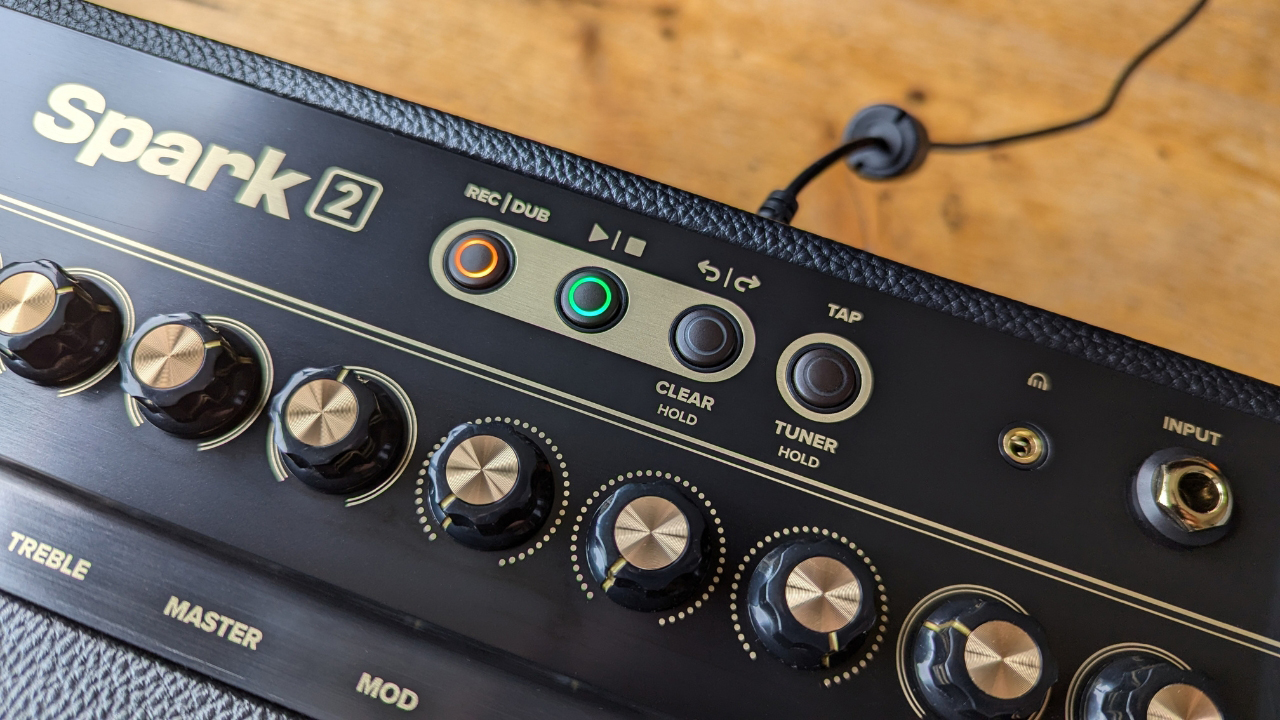
Spark 2 also sees the arrival of the most requested feature in a looper, and I’m happy to report it’s every bit as great as the rest of the amp. There are two modes to the looper, simple and groove. Simple looper behaves as many others do, simply press the button to record your loop, again to playback, and then once more to overdub. It can be run in timed mode with a click to a specific BPM. Or you can use it more like you would a pedal and just build your loops freeform.
Doing it the latter way is pretty tough without a footswitch, because you have to take your hands off the guitar to stop the loop in time. It makes it pretty much impossible to use unless you’re planning on ending on an open note. I didn't have a footswitch to test it, but PG did advise me the looper is compatible with the Spark Control X footswitch.
Timed loops work much better sans-footswitch as you get a four-count to set yourself before you start recording. You can set the amount of bars you want to run the loop for, and it automatically stops recording once you’ve hit that amount.
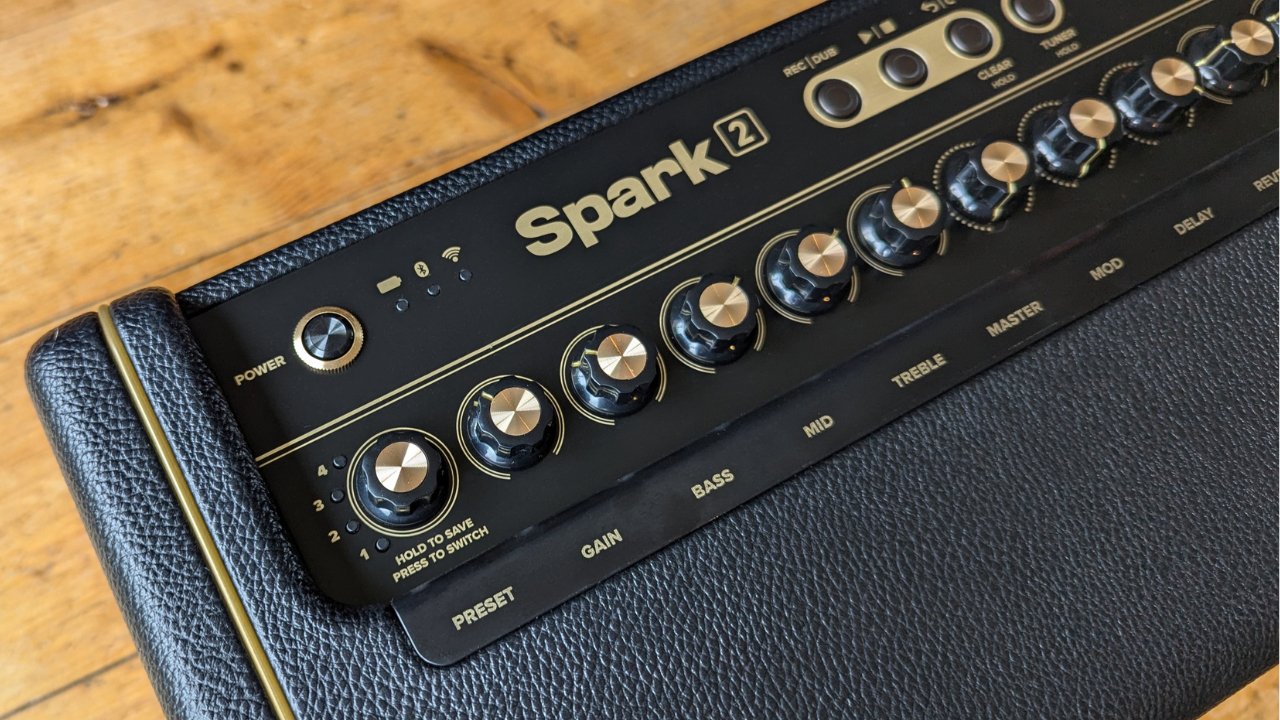
You’re greeted with a rotating wheel on the screen that lets you know where you are in the loop, and you can set yourself up for the next overdub, hitting the record button to capture your next loop before stopping it again. It’ll only record where you play, making it super effective for looping by yourself, without the need for an additional footswitch.
The Groove Looper works much the same as the timed loops, except you can add a drum pattern into the mix. There are a lot of drum patterns to choose from and you can filter by four genres which are rock, pop, blues, and funk. Not the most comprehensive offering, but absolutely plenty to play around with when coming up with song ideas or just honing your chops.
It’s got a shuffle function for adding a bit of swing to your count and the only thing it’s really lacking is the ability to add different time signatures. Hopefully, PG will address this in a firmware update, and with the inclusion of a footswitch in your daily routine, it really feels as though every single box has been ticked for the guitarist who wants to practice at home.
Positive Grid Spark 2 review: Verdict
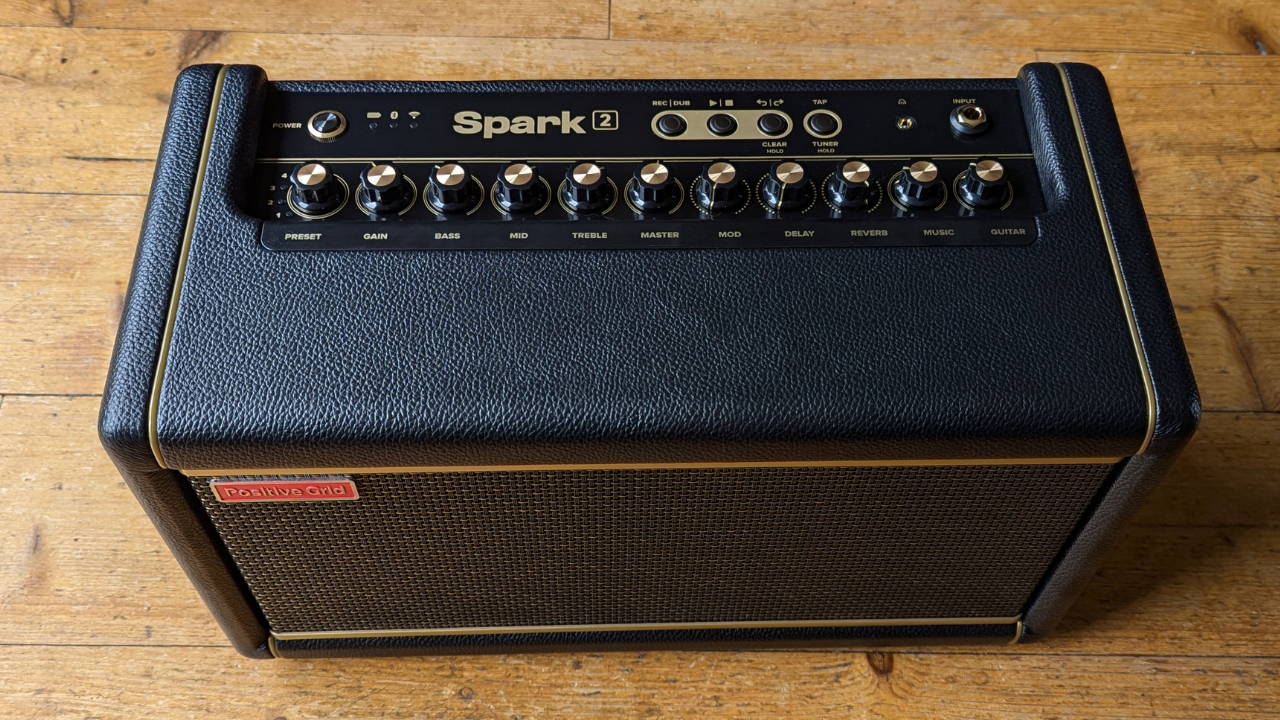
The original Spark is the definition of a modern classic amplifier, and Spark 2 is the perfect sequel. Adding more of everything in the best possible way, Positive Grid has knocked it out of the park when it comes to the latest iteration of their Spark amp. It is more evolution than revolution, but they’ve delivered everything guitarists have been asking for and more. It’s simply superb.
Positive Grid Spark 2 review: Specs
- TYPE: Digital modelling combo for guitar, bass and acoustic with BIAS Tone Engine and app integration
- POWER: 50W RMS Class D Amplifier
- SPEAKERS: 2 x 4-inch Full Range Speaker with custom angled horn
- TOP CONTROLS: Power Button, Eight Programmable Preset Selector, Amp Controls (Gain, Bass, Mid, Treble, Master, Mod, Delay, Reverb, Volume), Music Channel Volume, Looper Controls (REC/DUB, PLAY/STOP, UNDO/REDO/CLEAR with LEDs), Tap/Tuner Button
- ONBOARD EFFECTS: 33 Amp Models (For electric guitar, acoustic guitar, bass), 43 Effects (Noise Gate, Compressor, Distortion, Modulation/EQ, Delay, Reverb), Choose up to 3 pre-amp effects, 3 post-amp effects, and 1 amp model for each preset
- LOOPER: Up to 60 seconds of recording time
- SOCKETS: 1/4" Instrument Input x 1, 1/8" Headphone Output x 1, 1/4" Line Output x 2 (L/Mono & R), 1/8" Aux input x 1
- DIMENSIONS: 375 x 180 x 214 mm
- WEIGHT: 5.5 Kg
- CONTACT: Positive Grid







